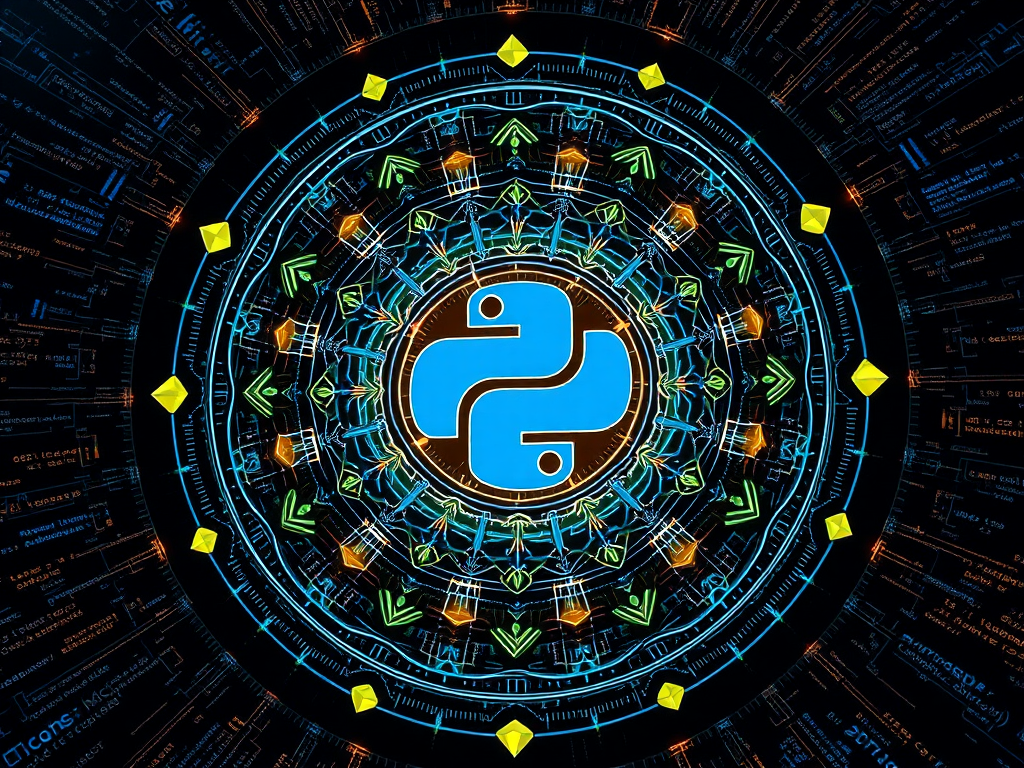Hello Python enthusiasts! Today let's talk about the treasure trove that is the Python Standard Library. To be honest, when I first encountered the Python Standard Library, I was as excited as finding Aladdin's lamp. Just think about it - being able to implement so many powerful functions without installing any additional packages is amazing! So, let's explore this programming toolbox together.
What is the Standard Library?
Simply put, the Python Standard Library is a collection of modules and packages that come with Python. It's like a "starter kit" that Python has prepared for us, packed with various useful tools. From file operations to network programming, from data processing to GUI development, it covers almost all scenarios we encounter in daily programming.
You might ask, why do we need a standard library? This goes back to Python's design philosophy. Python has always adhered to the "batteries included" philosophy, meaning Python aims to provide an out-of-the-box environment that allows you to quickly get started and focus on solving problems, rather than being bogged down by dependencies and environment configurations.
Why is the Standard Library so Important?
-
Ready to Use: No additional installation needed, you can use it right after installing Python. This greatly reduces the entry barrier and minimizes project dependency issues.
-
Stable and Reliable: The modules in the standard library have undergone rigorous testing and long-term use, offering high stability and reliability. You don't need to worry about version compatibility issues.
-
Well-Documented: Python provides comprehensive documentation for the standard library. Whatever problems you encounter, you can find answers in the documentation.
-
Cross-Platform: Most modules in the standard library are cross-platform, meaning your code can run on different operating systems with minimal modifications.
-
Performance Optimized: Many standard library modules are implemented in C, offering excellent performance.
Imagine if we didn't have the standard library - we'd have to implement basic functionality from scratch every time we write a program. How troublesome would that be! With the standard library, we can stand on the shoulders of giants and focus on solving more complex problems.
Main Modules in the Standard Library
Alright, enough theory, let's look at what treasures we have in the standard library! I'll select some commonly used modules and introduce their purposes and basic usage.
System Interaction Modules
os Module: Your Operating System Assistant
The os module is our bridge to interact with the operating system. Whether it's creating folders, deleting files, or getting environment variables, the os module can help you handle it easily.
Let's look at some common functions:
import os
os.mkdir("new_folder")
current_dir = os.getcwd()
print(f"Current working directory is: {current_dir}")
files = os.listdir(".")
print("Files in current directory:")
for file in files:
print(file)
os.remove("unwanted_file.txt")
These operations are frequently used in our daily programming. For example, you might need to create a temporary folder to store data while your program is running, or traverse all files in a directory for processing. The os module is made for these tasks!
sys Module: Python Interpreter's Friend
If the os module deals with the operating system, then the sys module deals with the Python interpreter itself. It provides many useful constants and functions that allow us to better control Python program execution.
Look at these examples:
import sys
print(f"Command line arguments are: {sys.argv}")
print(f"Python version is: {sys.version}")
print("Python module search paths:")
for path in sys.path:
print(path)
sys.exit(0) # Normal exit
sys.argv is particularly useful as it allows us to pass arguments to our program from the command line. Imagine you've written an image processing program - you can specify the image filename through command line arguments, isn't that convenient?
Time Processing Modules
time Module: Time Controller
Time is very important in programming. Whether it's logging, calculating program runtime, or implementing scheduled tasks, we can't do without time processing. The time module is created for this purpose.
import time
current_time = time.time()
print(f"Current timestamp: {current_time}")
print("Program will pause for 3 seconds...")
time.sleep(3)
print("Continue executing!")
formatted_time = time.strftime("%Y-%m-%d %H:%M:%S", time.localtime())
print(f"Formatted time: {formatted_time}")
The time.sleep() function is very useful in many scenarios. For example, when crawling web data, you can add some delay between requests to avoid putting too much pressure on the server.
datetime Module: Perfect Partner for Date and Time
Although the time module is powerful, sometimes we need more advanced date and time processing capabilities. This is where the datetime module comes in handy.
from datetime import datetime, timedelta
now = datetime.now()
print(f"Current date and time: {now}")
future_date = now + timedelta(days=30)
print(f"Date after 30 days: {future_date}")
formatted_date = now.strftime("%Y-%m-%d %H:%M:%S")
print(f"Formatted date: {formatted_date}")
date_string = "2023-06-15"
date_object = datetime.strptime(date_string, "%Y-%m-%d")
print(f"Date converted from string: {date_object}")
The power of the datetime module lies in its series of classes for representing dates and times, allowing us to perform various complex date calculations and formatting operations. This module is invaluable when handling logs, generating reports, or performing date-related data analysis!
Data Processing Modules
json Module: JSON Data Helper
In this internet age, JSON has become the universal format for data exchange. Python's json module allows us to easily handle JSON data.
import json
data = {
"name": "Alice",
"age": 30,
"city": "New York"
}
json_string = json.dumps(data, indent=2)
print("Python object to JSON string:")
print(json_string)
json_data = '{"name": "Bob", "age": 35, "city": "London"}'
python_obj = json.loads(json_data)
print("
JSON string to Python object:")
print(f"Name: {python_obj['name']}")
print(f"Age: {python_obj['age']}")
print(f"City: {python_obj['city']}")
Using the json module, we can easily convert between Python objects and JSON strings. This is very useful when handling API responses, configuration files, or data storage.
re Module: Regular Expression Wizard
Regular expressions are powerful tools for processing text, and the re module is Python's gateway to using regular expressions.
import re
text = "Contact us at [email protected] or [email protected]"
pattern = r'\b[A-Za-z0-9._%+-]+@[A-Za-z0-9.-]+\.[A-Z|a-z]{2,}\b'
emails = re.findall(pattern, text)
print("Matched email addresses:")
for email in emails:
print(email)
sentence = "The quick brown fox jumps over the lazy dog"
new_sentence = re.sub(r'\b\w{4}\b', '****', sentence)
print(f"
Original: {sentence}")
print(f"After replacement: {new_sentence}")
data = "apple,banana;cherry:grape"
fruits = re.split(r'[,;:]', data)
print("
Split fruit list:")
print(fruits)
Regular expressions might look complicated, but once mastered, they become powerful tools for text processing. Whether it's validating user input, extracting specific format data, or performing complex text replacement, regular expressions can help you handle it easily.
Math and Random Number Modules
random Module: Random Number Magician
In many scenarios, we need to generate random numbers. Whether it's simulation experiments, game development, or data sampling, the random module is our reliable assistant.
import random
random_int = random.randint(1, 100)
print(f"Random integer between 1 and 100: {random_int}")
fruits = ['apple', 'banana', 'cherry', 'date']
chosen_fruit = random.choice(fruits)
print(f"Randomly chosen fruit: {chosen_fruit}")
numbers = list(range(1, 11))
random.shuffle(numbers)
print(f"Numbers after shuffling: {numbers}")
random_float = random.uniform(0, 1)
print(f"Random float between 0 and 1: {random_float}")
The random module can not only generate random numbers but also help us randomly choose elements, shuffle lists, etc. This is very useful in data analysis and implementing game logic.
math Module: Mathematical Operations Helper
For some complex mathematical operations, we can turn to the math module. It provides many mathematical functions and constants, allowing us to perform more advanced mathematical calculations.
import math
sqrt_result = math.sqrt(16)
print(f"Square root of 16 is: {sqrt_result}")
power_result = math.pow(2, 3)
print(f"2 to the power of 3 is: {power_result}")
angle = math.pi / 4 # 45 degrees
sin_result = math.sin(angle)
cos_result = math.cos(angle)
print(f"Sine of 45 degrees: {sin_result}")
print(f"Cosine of 45 degrees: {cos_result}")
log_result = math.log(100, 10)
print(f"Logarithm of 100 base 10 is: {log_result}")
print(f"Pi π: {math.pi}")
print(f"Euler's number e: {math.e}")
The math module is widely used in scientific computing, engineering applications, financial analysis, and other fields. Its functions offer high precision and good performance, making it the go-to tool for mathematical calculations.
Practical Application: File Processing Helper
Alright, we've learned about some commonly used standard library modules. Now, let's combine this knowledge and write a practical program! We'll create a file processing helper that can help us analyze file information in a specified directory.
import os
import time
import json
def analyze_directory(path):
result = {
"total_files": 0,
"total_size": 0,
"file_types": {},
"largest_file": {"name": "", "size": 0},
"newest_file": {"name": "", "time": 0}
}
for root, dirs, files in os.walk(path):
for file in files:
file_path = os.path.join(root, file)
file_size = os.path.getsize(file_path)
file_time = os.path.getmtime(file_path)
file_ext = os.path.splitext(file)[1].lower()
result["total_files"] += 1
result["total_size"] += file_size
if file_ext not in result["file_types"]:
result["file_types"][file_ext] = 0
result["file_types"][file_ext] += 1
if file_size > result["largest_file"]["size"]:
result["largest_file"] = {"name": file, "size": file_size}
if file_time > result["newest_file"]["time"]:
result["newest_file"] = {"name": file, "time": file_time}
return result
def main():
directory = input("Please enter the directory path to analyze: ")
if not os.path.exists(directory):
print("Directory doesn't exist!")
return
print("Analyzing directory, please wait...")
start_time = time.time()
result = analyze_directory(directory)
end_time = time.time()
print("
Analysis results:")
print(f"Total files: {result['total_files']}")
print(f"Total size: {result['total_size'] / (1024*1024):.2f} MB")
print("
File type statistics:")
for ext, count in result['file_types'].items():
print(f" {ext if ext else 'No extension'}: {count}")
print(f"
Largest file: {result['largest_file']['name']} ({result['largest_file']['size'] / (1024*1024):.2f} MB)")
print(f"Newest file: {result['newest_file']['name']} ({time.ctime(result['newest_file']['time'])})")
print(f"
Analysis time: {end_time - start_time:.2f} seconds")
save_result = input("
Save analysis results to JSON file? (y/n): ")
if save_result.lower() == 'y':
with open('directory_analysis.json', 'w', encoding='utf-8') as f:
json.dump(result, f, ensure_ascii=False, indent=2)
print("Analysis results saved to directory_analysis.json")
if __name__ == "__main__":
main()
This program combines several modules we just learned:
osmodule for traversing directories and getting file informationtimemodule for calculating program runtime and getting file modification timesjsonmodule for saving analysis results to a JSON file
Through this example, you can see the power of the standard library. Using just built-in modules, we can quickly implement a useful file analysis tool. Imagine how troublesome it would be if we had to implement these features from scratch without these ready-made modules!
Conclusion
Well, our Python Standard Library exploration journey comes to a temporary end. We've only scratched the surface, exploring just the tip of the iceberg. There are many more powerful modules waiting for us to discover and learn, such as the socket module for network programming, the threading module for multi-threading programming, the zlib module for data compression, and so on.
Remember, whenever you encounter a programming problem, first ask yourself: "Is there a ready-made solution in the standard library?" Many times, you'll be pleasantly surprised to find that Python has already prepared the tools for you.
Learning the standard library not only improves your programming efficiency but also helps you better understand Python's design philosophy and best practices. So, keep exploring! With each new module you learn, you're one step closer to becoming a Python master.
Finally, I want to say that the most important thing in programming is not memorizing all the syntax and APIs, but developing problem-solving thinking. Through continuous practice, you'll gradually form your own programming intuition and know which tools to use in what situations. So, start practicing and apply what we've learned today to your own projects!
Do you have any thoughts or questions? Feel free to leave comments, let's discuss and improve together!
 Previous
Previous










